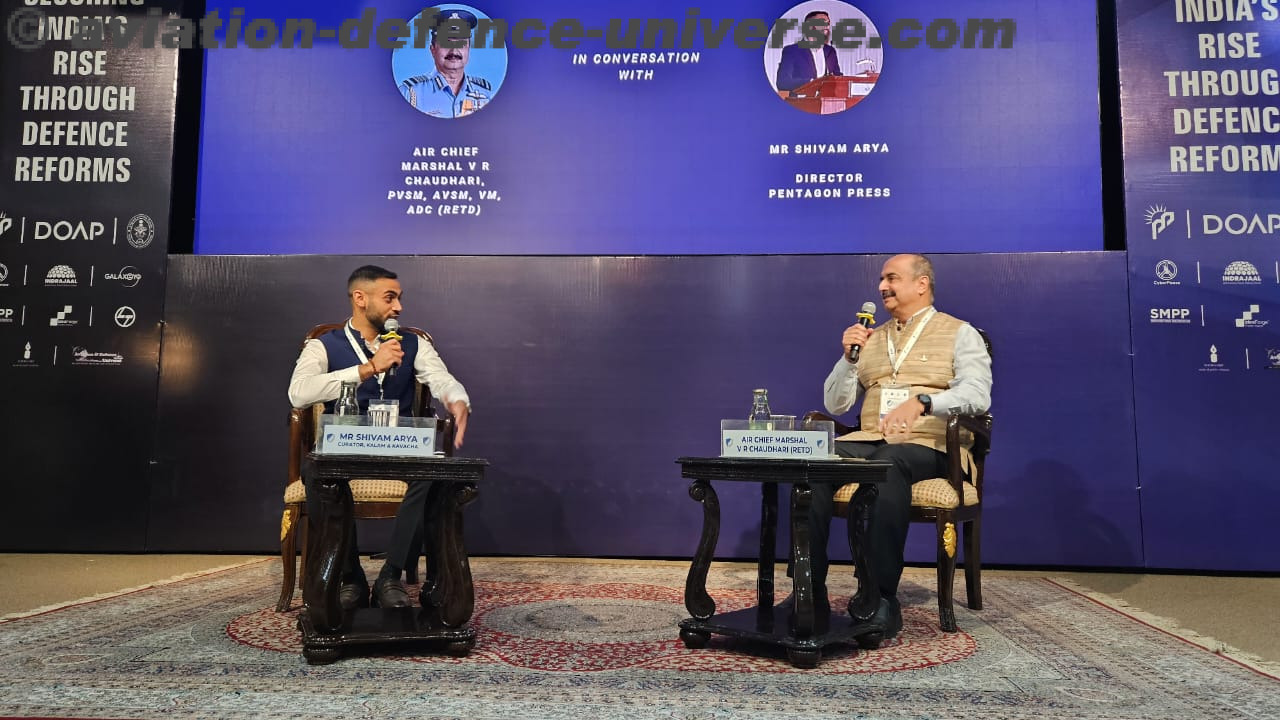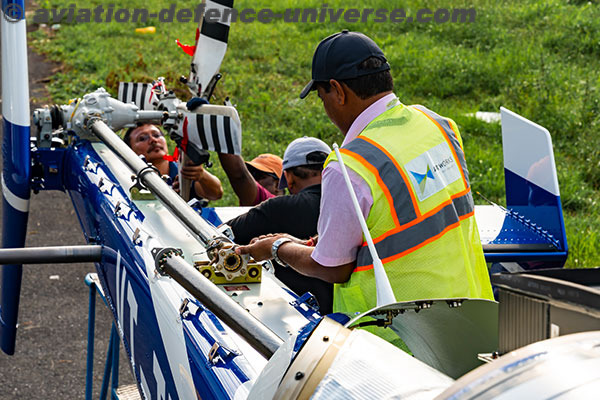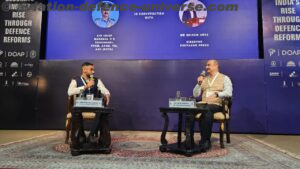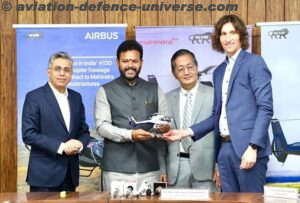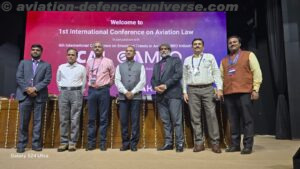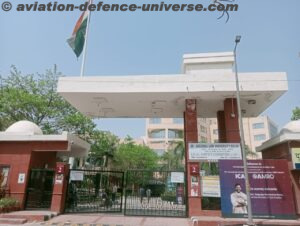- Notification effective July 15, 2024
By Sangeeta Saxena
New Delhi. 15 July 2024. The wait is over and the battle is finally won! The GST reduction on aviation MRO from 18% to 5% is from today a reality. When the Senior Economic Advisor Ministry of Civil Aviation, Piyush Srivastava told journalists on the sidelines of Air Cargo Summit in the national capital on 4th July 2024, that notification of the GST Council’s decision on lessening the GST on MROs from 18 to 5 percent should not take more than a week, he had hit the nail of the head. Exactly on the 8th day from this conversation, the notification was released with the date of enforcement of Monday, 15th July 2024. Relentless efforts by the MRO Association of India have finally got the desired results which are a welcome boost to the domestic maintenance, repair and overhaul (MRO) industry.
 “The MRO Association of India would like to thank all the Members in MoCA, MoD and MoF in making the much needed changes in the GST Regulations affecting the Aviation MRO in Bharat. We are confident that our nation will achieve much greater capability in this very strategic industry and bring Bharat closer to Air Sovereignty. I also want to thank all the members of the Association in showing tremendous resolve and faith in standing by me during the pendency of this regulatory change. We have much more to achieve and we shall while continuing to strengthen our great nation. Thank you all,” said Bharat Malkani, President MRO Association of India in an exclusive statement to Aviation & Defence Universe (ADU).
“The MRO Association of India would like to thank all the Members in MoCA, MoD and MoF in making the much needed changes in the GST Regulations affecting the Aviation MRO in Bharat. We are confident that our nation will achieve much greater capability in this very strategic industry and bring Bharat closer to Air Sovereignty. I also want to thank all the members of the Association in showing tremendous resolve and faith in standing by me during the pendency of this regulatory change. We have much more to achieve and we shall while continuing to strengthen our great nation. Thank you all,” said Bharat Malkani, President MRO Association of India in an exclusive statement to Aviation & Defence Universe (ADU).
It may be recalled that the 53rd GST Council met under the Chairpersonship of Union Minister for Finance & Corporate Affairs Nirmala Sitharaman in New Delhi on the 22nd of June 2024. The meeting was also attended by Union Minister of State for Finance Pankaj Chaudhary, Chief Ministers of Goa and Meghalaya; Deputy Chief Ministers of Bihar, Haryana, Madhya Pradesh, and Odisha; besides Finance Ministers of States & UTs (with legislature) and senior officers of the Ministry of Finance & States/ UTs. The GST Council inter alia made the following recommendation relating to changes in GST tax rates, measures for facilitation of trade and measures for streamlining compliances in GST. A uniform rate of 5% IGST will apply to imports of parts, components, testing equipment, tools and tool-kits of aircraft, irrespective of their HSN classification to provide a fillip to MRO activities subject to specified conditions.
 As per the Government of India, Ministry of Finance (Department of Revenue) Notification No. 28/2024-Customs dated 12th July 2024,” Under S. No. 544 the entry will be as 544A listed in any chapter of MRO components or parts which are prescribed in any of the following manuals – Aircraft Maintenance Manual (AMM), Component Maintenance Manual (CMM), Illustrated Parts Catalogue (IPCL), Structural Repair Manual (SRM), Standard Procedure Manual (SPM) of the OEMs, when imported into India for servicing, repair, maintenance or overhauling, subject to fulfilling respective conditions, the condition number of which is mentioned in the corresponding entry in column (6) against the serial number 536, 538 or 544 will have 5% GST charged. This notification shall come into force from the 15th day of July, 2024.”
As per the Government of India, Ministry of Finance (Department of Revenue) Notification No. 28/2024-Customs dated 12th July 2024,” Under S. No. 544 the entry will be as 544A listed in any chapter of MRO components or parts which are prescribed in any of the following manuals – Aircraft Maintenance Manual (AMM), Component Maintenance Manual (CMM), Illustrated Parts Catalogue (IPCL), Structural Repair Manual (SRM), Standard Procedure Manual (SPM) of the OEMs, when imported into India for servicing, repair, maintenance or overhauling, subject to fulfilling respective conditions, the condition number of which is mentioned in the corresponding entry in column (6) against the serial number 536, 538 or 544 will have 5% GST charged. This notification shall come into force from the 15th day of July, 2024.”
 “The revision in GST norms for the country’s MRO sector is a highly crucial, welcome step taken by the government. The shift places Indian MRO on par with Singapore, a regional MRO Hub – in terms of the taxation framework. As aviation maintenance moves up the Value chain from line & base maintenance to Engines and component overhaul, the component costs begin to progressively outweigh the labor costs. With this context, the 5% standardization will enhance the attractiveness of Indian MRO from a global standpoint, spurring investments to foster an indigenous MRO ecosystem, boosting self-reliance for the nation. At the ground level, the change translates into competitive pricing, expanding our addressable market by drawing-in a greater proportion of global MRO business into the country, ” D Anand Bhaskar, MD & CEO, Air Works Group welcomed the decision.
“The revision in GST norms for the country’s MRO sector is a highly crucial, welcome step taken by the government. The shift places Indian MRO on par with Singapore, a regional MRO Hub – in terms of the taxation framework. As aviation maintenance moves up the Value chain from line & base maintenance to Engines and component overhaul, the component costs begin to progressively outweigh the labor costs. With this context, the 5% standardization will enhance the attractiveness of Indian MRO from a global standpoint, spurring investments to foster an indigenous MRO ecosystem, boosting self-reliance for the nation. At the ground level, the change translates into competitive pricing, expanding our addressable market by drawing-in a greater proportion of global MRO business into the country, ” D Anand Bhaskar, MD & CEO, Air Works Group welcomed the decision.
MRO is one of the most important aviation support sectors. India’s commercial aircraft fleet has a fast expanding MRO sector, currently valued at $1.7 billion. With a corresponding rise in the fleet, this is predicted to expand at a rate of about 9% per year to reach $4 billion in 2031. However, 80–85% of this market is currently served internationally, with only 15-20% of it being handled domestically. Virtually 50% of this sector is made up of engine maintenance and repair, which is entirely outsourced. As a result, India is passing up a huge chance to create value.
 Ashok Gopinath, President & Accountable Manager at GMR Aero Technic ( GAT ) and GMR Aviation Academy since June 2023 based in Hyderabad, India, part of GMR group companies stated, “The Indian government under the able leadership of Honorable Prime Minister Modi has been spearheading various initiatives to bolster growth for the aviation industry in the country. The recent announcement by govt on uniform GST of 5% is an important move in the right direction. This move will help develop Component and Engine MRO business setup in the country. We thank the Ministry of Civil Aviation ( MoCA )and the Govt of India for initiative.”
Ashok Gopinath, President & Accountable Manager at GMR Aero Technic ( GAT ) and GMR Aviation Academy since June 2023 based in Hyderabad, India, part of GMR group companies stated, “The Indian government under the able leadership of Honorable Prime Minister Modi has been spearheading various initiatives to bolster growth for the aviation industry in the country. The recent announcement by govt on uniform GST of 5% is an important move in the right direction. This move will help develop Component and Engine MRO business setup in the country. We thank the Ministry of Civil Aviation ( MoCA )and the Govt of India for initiative.”
In addition, to maintain India’s fleet of more than 2000 aircraft, the defence MRO market is projected to reach a value of $3 billion by 2031. India’s ageing fleet, which includes some aircraft classes like the Mig-21s that are more than 30 years old, will propel the defence MRO business. Due to the low reliability and part obsolescence of such older aircraft, MRO costs are high. In order to meet the increasing demand, the Base Repair Depots (BRDs), which are typically run by the armed forces, will also require more assistance. Certain systems, like the IL76 aircraft and the Mi-17 series helicopters, are nearing the end of their technical lives and will need ongoing maintenance and life extension programmes. The Indian Air Force’s (IAF) Base Repair Depots (BRDs) may do some maintenance and overhaul tasks, although they primarily rely on OEMs for technical assistance and spare parts. The IAF had requested EOIs from Indian MRO companies to undertake full repair and overhaul of the Mi-17 platform in a joint venture with the OEM in order to solve this concern. Apart from the commercial & defence fleet,
 “This was long awaited and would provide boost to Indian MRO industry. So far Indian MRO industry is confined to labour intensive aircraft line and base maintenance jobs. For Maintenance of engines and components, at least 80% of entire expense is in form of imported material. A GST (18-28%) entails loss of entire labour arbitrage India was having. With this amendment, looking forward to renewed interest of foreign OEM tying up with Indian MROs to set up shops in India,” said AI Engineering Services Ltd (AIESL) CEO Sharad Agarwal. Government-owned AI Engineering Services Ltd (AIESL) is in discussions with foreign carriers to carry out maintenance checks on their aircraft at its facilities. AIESL was carved out as a subsidiary of Air India to provide engineering services to the national carrier. Even now, over 50 per cent of its business comes from servicing Air India’s aircraft, and the remaining from defence aircraft, and other domestic and foreign airlines.
“This was long awaited and would provide boost to Indian MRO industry. So far Indian MRO industry is confined to labour intensive aircraft line and base maintenance jobs. For Maintenance of engines and components, at least 80% of entire expense is in form of imported material. A GST (18-28%) entails loss of entire labour arbitrage India was having. With this amendment, looking forward to renewed interest of foreign OEM tying up with Indian MROs to set up shops in India,” said AI Engineering Services Ltd (AIESL) CEO Sharad Agarwal. Government-owned AI Engineering Services Ltd (AIESL) is in discussions with foreign carriers to carry out maintenance checks on their aircraft at its facilities. AIESL was carved out as a subsidiary of Air India to provide engineering services to the national carrier. Even now, over 50 per cent of its business comes from servicing Air India’s aircraft, and the remaining from defence aircraft, and other domestic and foreign airlines.
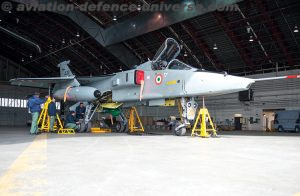 India also has a fleet of aircraft & helicopters which are used for non-scheduled operations such as charters. This fleet presents an additional market opportunity for MROs over & above the commercial & defence segments. This decision on lessening of GST will help Indian MROs to put their right foot forward and capture Indian market thereby creating a possible ability to fulfil the domestic demand at compatible rates to foreign MROs at Singapore, Malaysia and Srilanka. The MRO industry in India is on the cusp of a new awakening and at the end it is up to it to encash the situation to it’s advantage. The road is still not very smooth and the ride can be bumpy with so many foreign MROs setting up facilities in India. Indian MROs might need to adopt a strategy of collaborating with them creating friendly ecosystems both for MRO activities and supply chain management of these big international giants.
India also has a fleet of aircraft & helicopters which are used for non-scheduled operations such as charters. This fleet presents an additional market opportunity for MROs over & above the commercial & defence segments. This decision on lessening of GST will help Indian MROs to put their right foot forward and capture Indian market thereby creating a possible ability to fulfil the domestic demand at compatible rates to foreign MROs at Singapore, Malaysia and Srilanka. The MRO industry in India is on the cusp of a new awakening and at the end it is up to it to encash the situation to it’s advantage. The road is still not very smooth and the ride can be bumpy with so many foreign MROs setting up facilities in India. Indian MROs might need to adopt a strategy of collaborating with them creating friendly ecosystems both for MRO activities and supply chain management of these big international giants.












